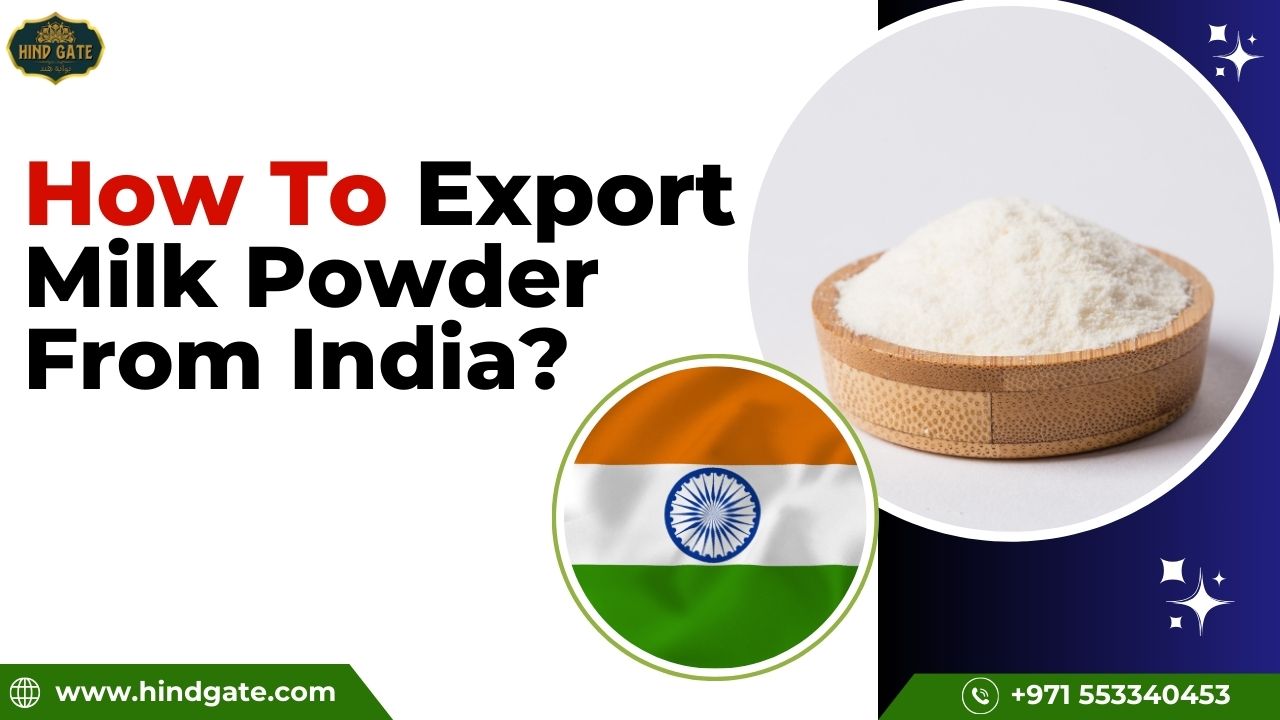
How to Export Milk Powder From India? A Complete Guide
India’s dairy industry is one of the largest in the world, producing millions of tonnes of milk annually. Among its many dairy products, milk powder has gained significant popularity in the global market due to its long shelf life, ease of transport, and versatility in food manufacturing.
With growing demand from countries in Asia, Africa, and the Middle East, many entrepreneurs are now exploring how to export milk powder from India profitably. Furthermore, in this guide, we will discuss the types of milk powder, the export process, the documentation required, and best practices for succeeding in the dairy export business.
Introduction to Milk Powder Export from India
Milk powder is made by evaporating milk to remove water content, resulting in a dry, powdered form that retains most of the milk’s nutritional value. It’s widely used in baking, confectionery, baby food, and instant beverages.
In addition, India’s reputation for high-quality dairy products has helped it expand its market share in the global market. From skimmed milk powder to whole milk powder, Indian exporters cater to a variety of international requirements.
Additionally, many exporters diversify their portfolios by shipping multiple agricultural items, for example, milk powder exporters frequently ship tea from India to global markets.
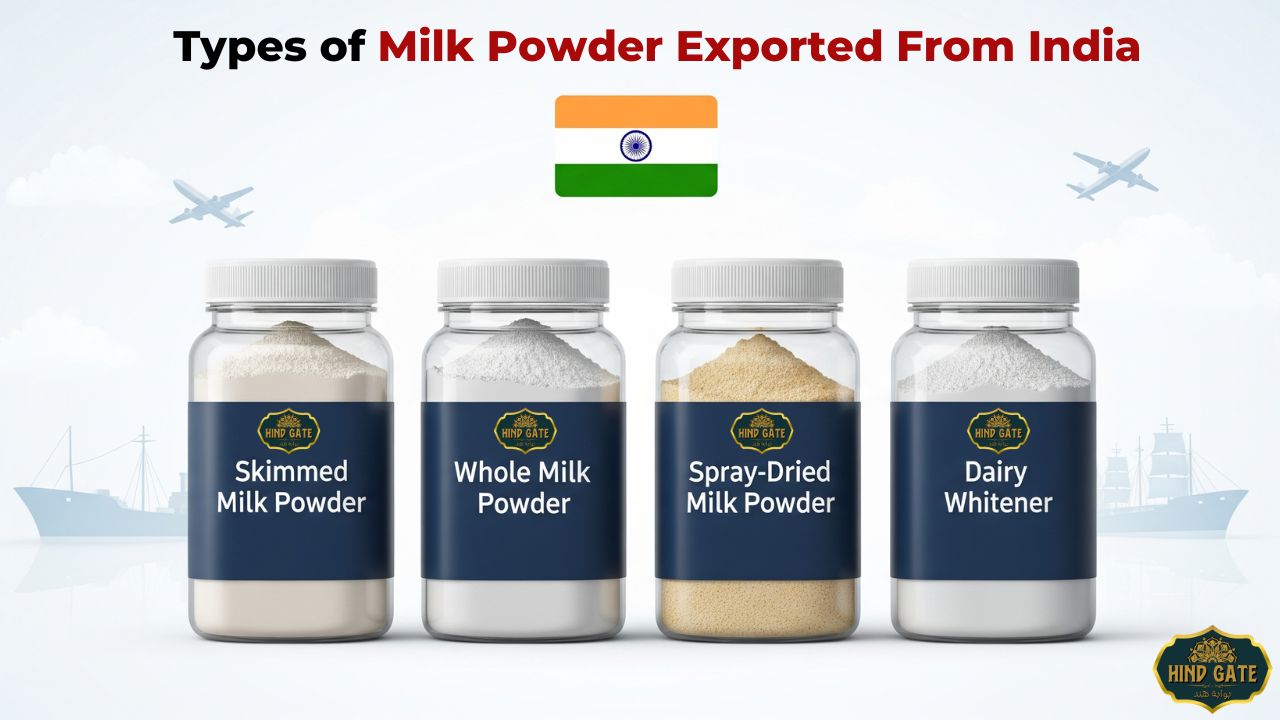
Types of Milk Powder Exported From India
India produces a variety of high-quality dairy products, and those who export milk powder from India can choose from several types to meet global demand.
| Type of Milk Powder | Description | Common Uses |
|---|---|---|
| Skimmed Milk Powder (SMP) | Low-fat powdered milk made by removing most of the cream | Bakery items, confectionery, diet products |
| Whole Milk Powder (WMP) | Full-fat milk powder with a creamy texture | Beverages, desserts, ice cream |
| Whey Powder | By-product of cheese production rich in protein | Sports nutrition, bakery, dairy drinks |
| Dairy-Based Infant Formula | Nutritionally balanced formula for babies | Baby food manufacturing |
| Casein & Caseinate Products | Milk protein concentrate | Cheese making, protein supplements |
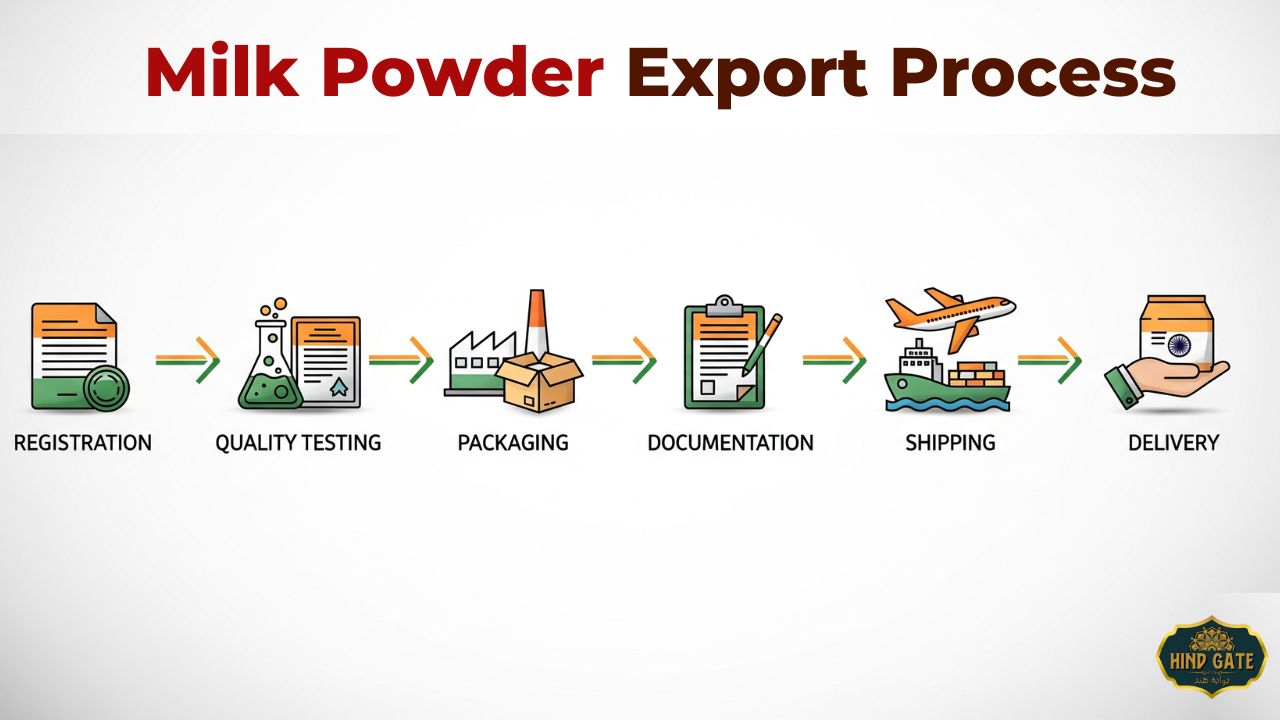
Step-by-Step Milk Powder Export Process
The step-by-step milk powder export process helps businesses efficiently export milk powder from India while meeting global quality and compliance standards.
1. Register Your Export Business
- Choose a legal structure (Proprietorship, Partnership, Pvt. Ltd., or LLP)
- Obtain Import Export Code (IEC) from DGFT
- Get FSSAI License for food product exports
- Register with APEDA for agri-based product promotion
2. Ensure Quality Certification & Lab Testing
International buyers require strict quality control. You’ll need certifications for:
- Fat content percentage
- Moisture level
- Microbial safety tests
- Nutritional labeling compliance
3. Source Your Product
Work with trusted dairy cooperatives or processing plants. Decide whether you will export in:
- Bulk quantities for industrial use
- Retail packs for direct consumer sale
Moreover, some exporters have multiple commodities to trade, such as those who trade dairy but also export spices from India to diversify revenue streams.
4. Packaging & Labeling Requirements
Use food-grade moisture-proof packaging such as:
- 25kg or 50kg multi-layer paper bags with inner polyethylene lining
- Metal cans for retail packaging
Labels must include:
- Product name & type
- Net weight
- Country of origin
- Nutritional facts
- Batch number & expiry date
5. Find International Buyers
- List your products on B2B platforms like Alibaba, IndiaMART, and TradeIndia
- Participate in international food expos
- Network with importers and distributors via export councils
- Offer free samples to build trust
6. Logistics & Shipping
- Sea freight is cost-effective for bulk shipments, while air freight suits urgent smaller orders
- Partner with a Customs House Agent (CHA) for documentation and clearance
- Follow import regulations of the destination country
7. Payment & Contracts
Safe payment methods include:
- Letter of Credit (LC)
- Advance Telegraphic Transfer (TT)
- Escrow services for smaller orders
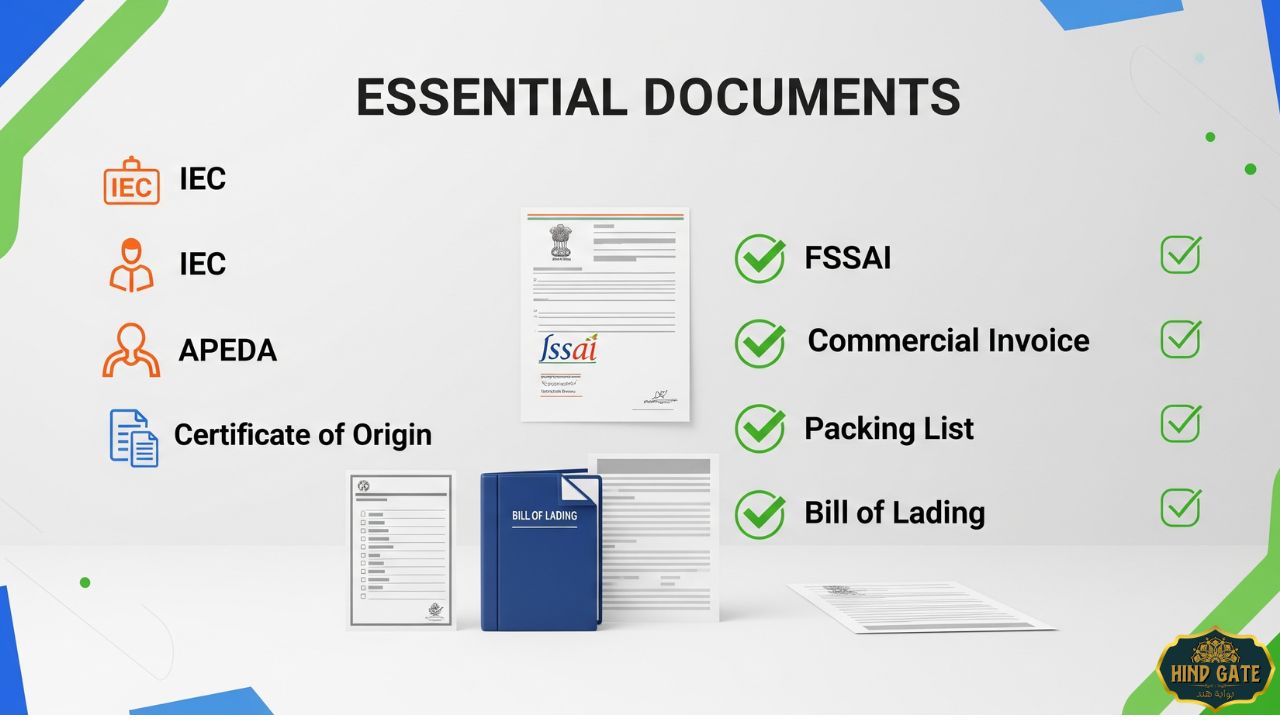
Documents Required for Milk Powder Export from India
The documents required for milk powder export from India ensure compliance with international trade regulations and smooth customs clearance.
- Import Export Code (IEC) – A mandatory identification number for all export businesses in India.
- APEDA Registration – Required for agricultural and processed food exports, helping promote Indian products globally.
- FSSAI License – Ensures the milk powder meets Indian and international food safety standards.
- Commercial Invoice – Provides details of the price, buyer, seller, and transaction terms.
- Packing List – Contains an itemized list of the milk powder products in the shipment.
- Certificate of Origin – Certifies that the milk powder is manufactured in India.
- Health Certificate – Confirms that the milk powder is safe for human consumption.
- Bill of Lading / Airway Bill – Official transport document for sea or air shipments.
- Insurance Policy – Protects the exporter against potential shipment risks.
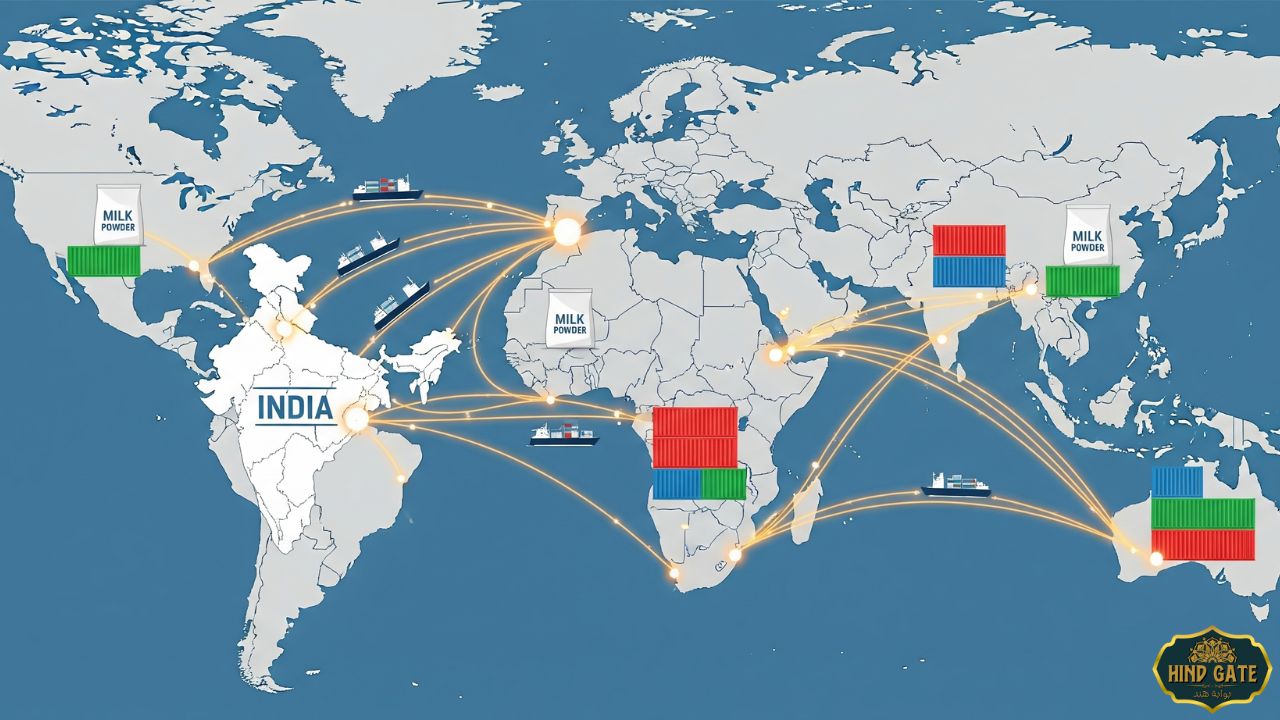
Which Country Imports Milk Powder from India?
Several nations regularly import milk powder from India, with demand driven by quality, competitive pricing, and consistent supply.
| Country | Type of Milk Powder in Demand | Market Trend |
|---|---|---|
| UAE | Skimmed & Whole Milk Powder | Steady high demand |
| Saudi Arabia | Whole Milk Powder | Premium market segment |
| Bangladesh | Skimmed Milk Powder | Seasonal demand spikes |
| Egypt | Skimmed Milk Powder | Affordable imports |
| Kenya | Whole & Skimmed | Growing dairy industry needs |
| Philippines | Skimmed Milk Powder | Rising bakery sector demand |
| Sri Lanka | Whole Milk Powder | Consistent imports |
Compliance & Legal Considerations
Exporters must follow:
- Codex Alimentarius standards for milk products
- ISO certification for quality management
- Country-specific import health regulations
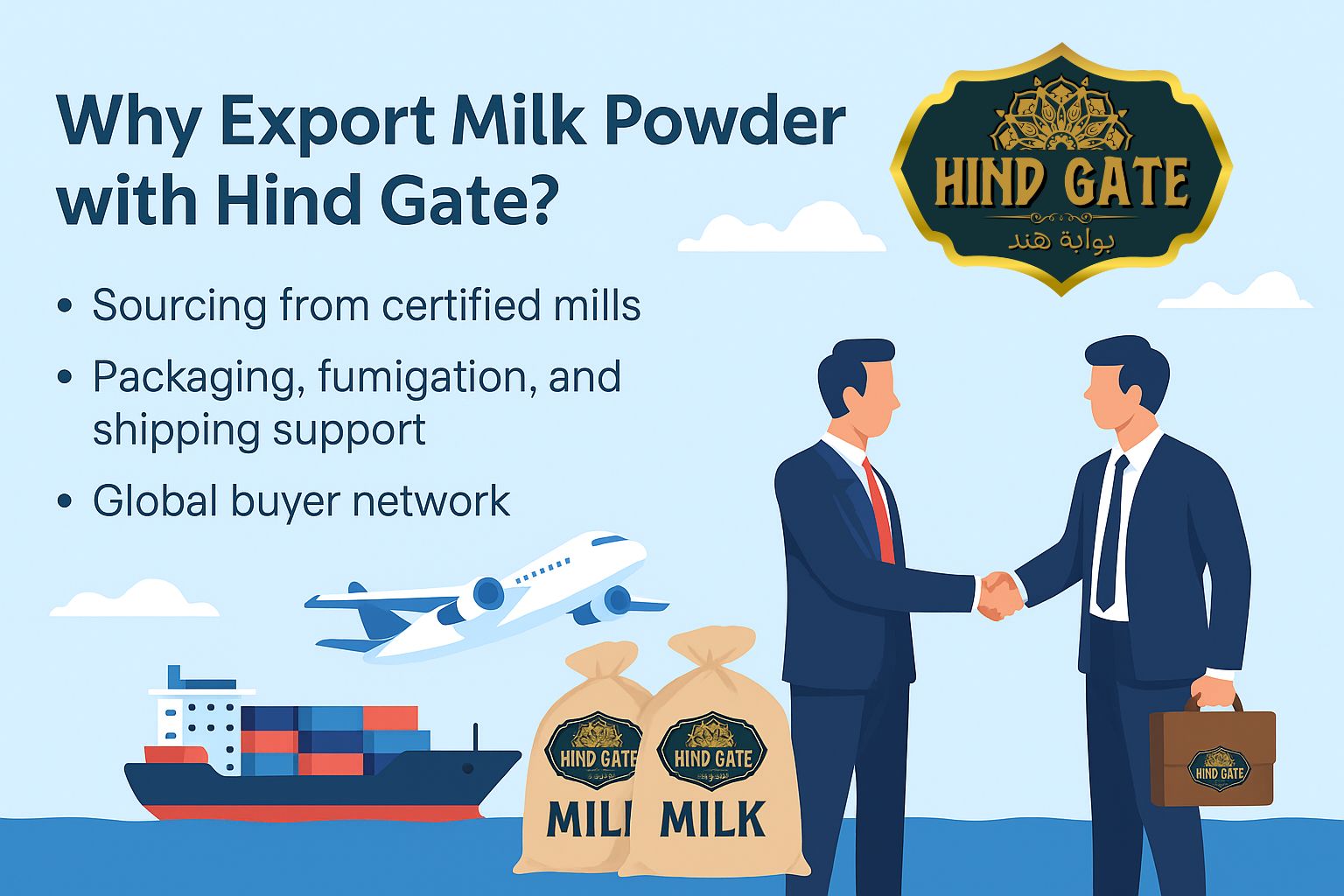
Why Export Milk Powder with Hind Gate?
- Product sourcing from certified dairy plants
- Quality testing & packaging compliance
- Global buyer connections
- Export documentation assistance
Therefore, they also help businesses expand into multiple categories, such as dairy and exporting coffee from India to international clients.
Conclusion
With global consumption of dairy products on the rise, India’s position as a trusted supplier of milk powder offers immense opportunities. Moreover, from the Middle Eastern premium markets to the African industrial markets, the potential is vast.
The same export expertise that allows India to export rice from India competitively can be applied to milk powder. Additionally, by following the right process, obtaining certifications, and targeting the right buyers, you can develop a profitable dairy export business.
Looking to export milk powder from India? Connect with Hind Gate for hassle-free export solutions.
Ready to Export Milk Powder with Confidence?
Get personalized assistance from our Milk Powder export specialists.



